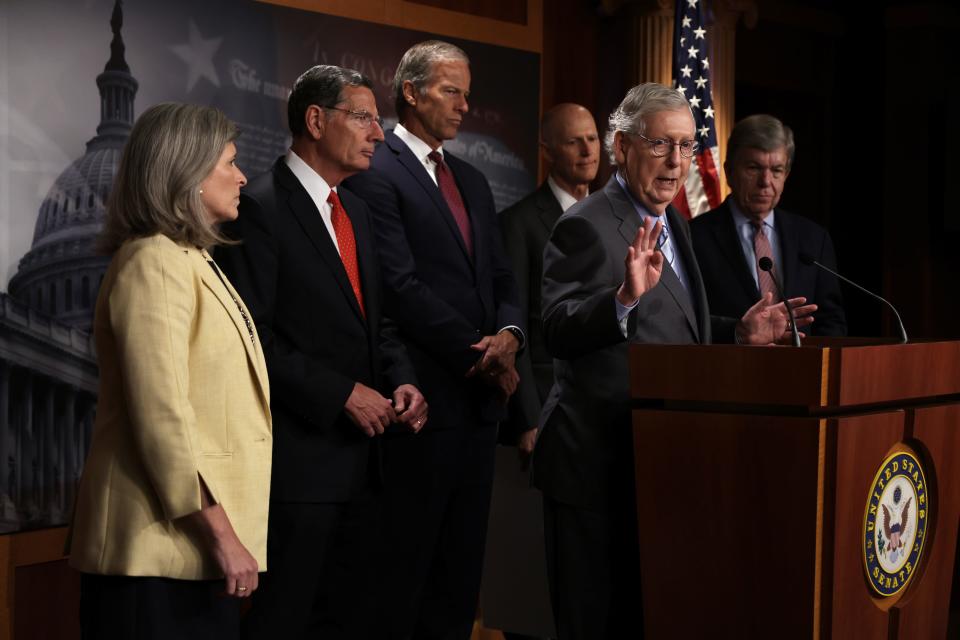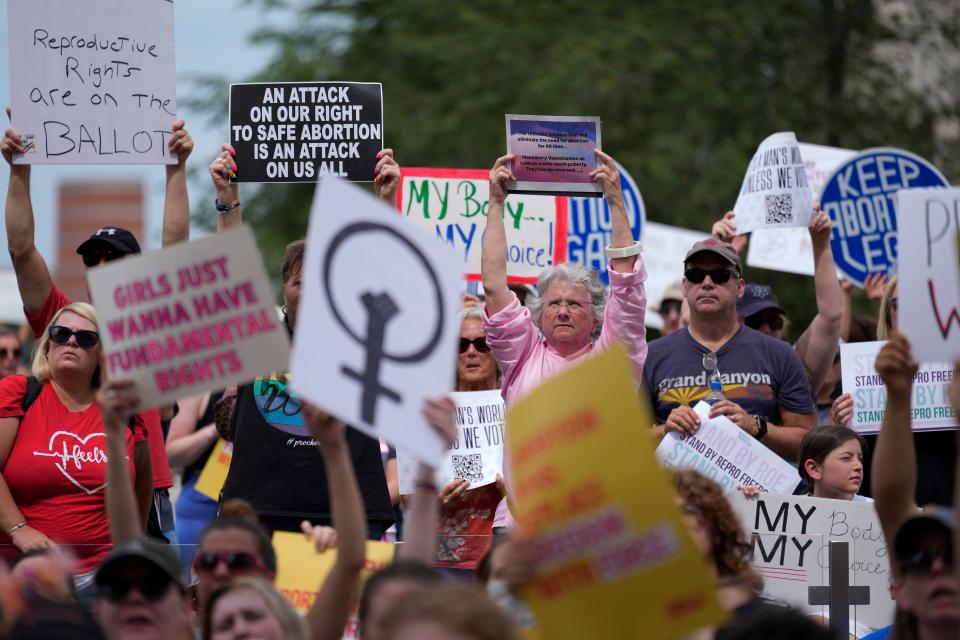Post-Roe, what does it mean to be anti-abortion? GOP split on what's next
WASHINGTON – For decades, conservatives have called for an end to abortion. Now that the Supreme Court has granted their wish, Republicans are being forced to stake out specific positions on national abortion legislation in the wake of a post-Roe America.
Can the GOP pass a federal ban? Should abortion be allowed in cases of rape or incest? What if the life of the mother is at risk? Will interstate travel for patients seeking an abortion be criminalized?
While historically the GOP had been able to galvanize under a blanket of "defending the unborn," the ruling last month by the Supreme Court is testing the durability of the GOP’s argument that abortion rights rest with individual states. And it's exposing fault lines on what it means to be "pro-life" and whether there should be any limits on the restrictions states place on abortion access.
“I think the majority of states, pretty close, are going to have abortion legal to a certain period," said Sen. Lindsey Graham, a South Carolina Republican who wants to prohibit most abortions after 15 weeks of pregnancy. "And, as that sorts itself out, then we’ll kind of figure out where to go from there."
Even leaving the issue to states puts Republicans on the spot, as evidenced by the case of a 10-year-old pregnant Ohio girl who was raped and had to travel to Indiana for an abortion. The story is emblematic of the questions raised for GOP legislators who backed the reversal of Roe and are now grappling with what comes next.
Conversations between more than 20 GOP lawmakers and USA TODAY revealed a lack of consensus on a national abortion ban and other areas where Democrats say the opposing party could restrict the procedure if Republicans win the majority of both the House and the Senate in the fall.
Some members said they see new room for federal legislation in the wake of the Dobbs decision that overturned Roe, while others pointed to the filibuster and the need for new laws to come from the states.

More: Restricting travel for abortion would be 'unconstitutional,' Iowa Sen. Chuck Grassley says
In the days following the leaked version of the abortion access decision but before the official ruling was issued, Senate Minority Leader Mitch McConnell, R-Ky., told USA TODAY that if the draft opinion held, a national abortion ban is “possible,” but it “would depend on where the votes were."
The Republican leader has been resolute that he will not support a filibuster carveout to pass abortion restrictions, meaning any legislation will still require 60 votes to pass: a tall task with a divided Senate.
More: McConnell calls US abortion ban 'possible,' says he won't change filibuster to pass it
Some Democrats have called for a suspension of the filibuster to pass legislation making abortion legal nationally, a move highly criticized by Republicans. But Sen. Lisa Murkowski of Alaska – one of the few GOP Senators who supports protecting abortion access at the federal level – warned that "it is entirely possible" her Republican colleagues would utilize a filibuster carveout to push through a national abortion ban if they win the majority in November.
“You don't always have the luxury of being in the majority all the time,” she said.
Sen. Ted Cruz, R-Texas, said that abortion will primarily be legislated at the state level.
Still, Cruz said, “There'll be federal legislation.”
Do Republicans support penalties for women who travel out of state for an abortion?
One of the biggest concerns has been restricting patients ability to seek care in other states. The president himself has raised the issue.
"People are going to be shocked when the first state...tries to arrest a woman for crossing a state line to get health services," Biden told Democratic governors. "I don’t think people believe that’s going to happen. But it’s going to happen ."
So far, no state has passed legislation criminalizing interstate travel for the purposes of obtaining an abortion.
“That's a ludicrous statement from a White House that has failed on every issue facing the country,” said Florida GOP Rep. Byron Donalds. “Nobody is proposing legislation like that."
Several GOP lawmakers told USA TODAY said they would not vote for legislation that allows for the arrest or prosecution of women who travel out of state for the purposes of obtaining an abortion.
“If that was happening, I would support legislation to stop that,” said Florida Sen. Rick Scott, chair of the National Republican Senatorial Committee.
Scott's home state passed a 15-week abortion ban signed into law in April by Florida Gov. Ron DeSantis that provides no exceptions for victims of rape or human trafficking. The Republican senator said that while he is personally against abortion, he supports exceptions for rape, incest and life of the mother.
But how they vote is really the question.
Only three Republicans out of 208 voted for a Democratic bill the House passed last week to protect women who cross state lines to get an abortion. Two of those three Republicans are not running for reelection.
And, when Democratic senators moved to unanimously pass a bill seeking to protect interstate travel for the purposes of abortion on Thursday, they were blocked by GOP Sen. James Lankford of Oklahoma. Oklahoma was the first in the nation to effectively end the availability of the procedure in May.
After Dobbs, some Democratic lawmakers worry a Republican-controlled Congress would try to pass restrictions on abortion that progressively eat away at women's access to reproductive care.
"I think that there are any number of ways that they can extend that to contraception, that they can change the interstate commerce clauses so that they are able to stop women from traveling across state lines," said Washington Rep. Pramila Jayapal, who chairs the Congressional Progressive Caucus.
What types of federal legislation do Republican lawmakers support?
Conservative political groups are pushing for a near complete federal ban on abortion after a "fetal heartbeat" is detected, which is typically defined as at or about six weeks after fertilization.
Legislation in the House proposed by Republican Rep. Mike Kelly of Pennsylvania to do so already has 119 sponsors. Sen. Josh Hawley, R-Mo., told USA TODAY he envisions legislation that would block abortion after 15 weeks, pointing to a recent Harvard University Center for Political Studies poll in which 69% of male respondents and 75% of female respondents said they think their state should not allow abortion after 15 weeks.
“I think where there's national consensus, it would be appropriate for Congress to act,” Hawley said. “Where there's not consensus, then I think that voters ought to be able to weigh in in the States.”

The former Missouri attorney general who is considered a potential 2024 presidential candidate said: “Practically speaking, we're looking here at a period where the states are really going to be in the forefront, and that's good, that's fine.” In Hawley's home state, a trigger ban went into action after the Dobbs decision.
In May, the Washington Post reported that Iowa Sen. Joni Ernst planned to introduce Senate legislation banning abortion after six weeks. But asked about the legislation last week, the Republican said Congress should not be dictating the rules.
“We'll have those discussions here, but I'm not going to commit to any one particular piece of legislation,” Ernst told USA TODAY.
GOP Sens. Susan Collins of Maine and Murkowski introduced their own abortion legislation this year, the Reproductive Choice Act, which would prohibit states from imposing "undue burden on the ability of a woman to choose whether or not to terminate a pregnancy before fetal viability."
Collins has been working with Democratic Sen. Tim Kaine of Virginia to iron out bipartisan legislation that would codify Roe and several other Supreme Court decisions, but said she does not think most of her caucus will be on board.
“I believe most Republicans believe this issue should be decided by individual states rather than a national law,” Collins told USA TODAY, saying she would “of course not” support any type of national law to ban abortion.

GOP Rep. Nancy Mace of South Carolina said that Congress has an opportunity to play a role determining the rules around abortion, even though the issue is currently up to the states to decide. She said she supports for exceptions for rape, incest, the life of the mother, and access to birth control.
“I'm going to support legislation that protects women that go out of state or travel out of the country,” she added. “I'm going to support legislation that protects women's access to any form of birth control, including IUDs.”
Mace was not among the three Republicans to vote for House bill last week that would protect women who travel to a different state for an abortion.
Sen. Bill Hagerty, R-Tenn., said he believes the Dobbs decision returns the issue of abortion to the states, but pointed to Democratic attempts at codifying abortion access in the Senate as a potential sign that there could be GOP-led federal legislation if Republicans regain control of the chamber.
“It’s hard to say what will happen, we’ve already seen the Democratic party – they’ve attempted to do that already,” Hagerty said.
Senate Democrats in May attempted to pass the Women's Health Protection Act, which would guarantee a national right to abortion, but the attempt was blocked by all Republicans and West Virginia Democratic Sen. Joe Manchin.
Democratic efforts: Senate fails to make Roe v. Wade law of land amid expected Supreme Court opinion curbing abortion rights
States rights advocates push for Congress to not legislate abortion
Other Republicans are taking a hard line against any congressional action, arguing that the Dobbs decision intentionally left abortion to the states and that Congress should not interfere with it.
“The states ought to decide rather than have Washington dictate,” Senate Republican Conference chair Sen. John Barrasso, the third-ranking Republican senator, told USA TODAY.
West Virginia Republican Sen. Shelley Moore Capito also said the states should be the laboratories of policy.
Donalds, the Florida Republican lawmaker, questioned whether the Supreme Court ruling allows for the federal government to legislate abortion law at all.
"The legal authority of Congress is actually quite limited with respect to abortion, because of the Dobbs decision," he said. "Different states are going to make their own determinations."
Many Republicans have taken a wait and see approach – leaving the door open on possible areas of federal restriction – but saying they need to see what happens in the states first.
"We're in new territory now following Dobbs," said GOP Sen. Mitt Romney of Utah.
This article originally appeared on USA TODAY: Republicans wrestle with nationwide abortion ban, overriding state laws

